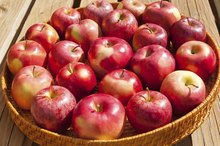Nectarines and the Glycemic Index
The glycemic index ranks food on a scale of 0 to 100. How high and how quickly a particular food raises blood sugar levels determines where a food falls on the scale. The lower the ranking, the less impact the food has on blood sugar and insulin fluctuations. Following a diet that emphasizes lower glycemic-index foods can help diabetics control glucose levels and reduce insulin resistance, according to the University of Sydney. Lower glycemic-index foods can also be beneficial for weight loss.
Nectarines' Glycemic Ranking
Raw nectarines have a glycemic index rank of 43, according to the University of Sydney's website. The ranking is based on a serving of 120 grams, or approximately 4 ounces. Nectarines are low glycemic-index foods because, according to Self Magazine, any food with a glycemic index of 55 or below is considered low. Any ranking above 70 is high and will cause blood sugar levels to rise rapidly.
- Raw nectarines have a glycemic index rank of 43, according to the University of Sydney's website.
- Nectarines are low glycemic-index foods because, according to Self Magazine, any food with a glycemic index of 55 or below is considered low.
Related Articles
References
- Harvard Medical School: Glycemic Index and Glycemic Load For 100+ Foods
- SELF Magazine Nutrition Data: Glycemic Index
- Ojo O, Ojo OO, Adebowale F, Wang XH. The effect of dietary glycaemic index on glycaemia in patients with type 2 diabetes: A systematic review and meta-analysis of randomized controlled trials. Nutrients. 2018;10(3):373. Published 2018 Mar 19. doi:10.3390/nu10030373
- Glycemic Index and Diabetes. American Diabetes Association
- Search for the Glycemic Index. The University of Sydney
- Zeevi D, Korem T, Zmora N, et al. Personalized Nutrition by Prediction of Glycemic Responses. Cell. 2015;163(5):1079-1094. doi:10.1016/j.cell.2015.11.001+
- Sacks FM, Carey VJ, Anderson CA, et al. Effects of high vs low glycemic index of dietary carbohydrate on cardiovascular disease risk factors and insulin sensitivity: the OmniCarb randomized clinical trial. JAMA. 2014;312(23):2531-41. doi:10.1001/jama.2014.16658.
- Vega-lópez S, Venn BJ, Slavin JL. Relevance of the Glycemic Index and Glycemic Load for Body Weight, Diabetes, and Cardiovascular Disease. Nutrients. 2018;10(10). doi:10.3390/nu10101361
- Glycemic Index Database. University of Sydney. Updated October 13, 2020
- Eleazu C. O. (2016). The concept of low glycemic index and glycemic load foods as panacea for type 2 diabetes mellitus; prospects, challenges and solutions. African health sciences, 16(2), 468–479. doi:10.4314/ahs.v16i2.15
- Foster-Powell, Kaye, Holt, Susanna and Brand-Miller, Janette. "International table of glycemic index and glycemic load values: 2002." American Journal of Clinical Nutrition. 76,:1: 5-56 (2002).
- International Carbohydrate Quality Consortium, Jenkins, D. J., Willett, W. C., Astrup, A., Augustin, L. S., Baer-Sinnott, S., … Wolever, T. M. (2014). Glycaemic index: did Health Canada get it wrong? Position from the International Carbohydrate Quality Consortium (ICQC). The British journal of nutrition, 111(2), 380–382. doi:10.1017/S0007114513003905
- Leroux, MarcusFoster-Powell, Kaye, Holt, Susanna and Brand-Miller, Janette. "International Table of Glycemic Index and Glycemic Load Values: 2002." American Journal of Clinical Nutrition. Vol. 76, No. 1, 5-56, (2002).
- Lui, S., Willett, WC, et al. "A prospective study of dietary glycemic load, carbohydrate intake, and risk of coronary heart disease in US women.." American Journal of Clinical Nutrition. 71(6):1455-61. (2001).
- Mayer-Davis, E.J., Dhawan, A et al. "Towards understanding of glycaemic index and glycaemic load in habitual diet: associations with measures of glycaemia in the Insulin Resistance Atherosclerosis Study.." British Nutrition Journal. 95(2):397-405. (2006).
- Sacks, F. M., Carey, V. J., Anderson, C. A., Miller, E. R., 3rd, Copeland, T., Charleston, J., … Appel, L. J. (2014). Effects of high vs low glycemic index of dietary carbohydrate on cardiovascular disease risk factors and insulin sensitivity: the OmniCarb randomized clinical trial. JAMA, 312(23), 2531–2541. doi:10.1001/jama.2014.16658
- Salmeron, J, Manson, JE, et al. "Dietary fiber, glycemic load, and risk of non-insulin-dependent diabetes mellitus in women.." Journal of the American Medical Association. 12;277(6):472-7. (1997).
- Vega-López, S., Venn, B., & Slavin, J. (2018). Relevance of the Glycemic Index and Glycemic Load for Body Weight, Diabetes, and Cardiovascular Disease. Nutrients, 10(10), 1361. doi:10.3390/nu10101361
- Zeevi, D. Korem N. et al. Personalized Nutrition by Prediction of Glycemic ResponsesCell. 163:(5):1079-94. November 2015.
Writer Bio
K.T. Parker is the author of multiple fiction novels and many articles, mostly about health topics. Her education in nutrition augments her pursuit of a degree in Naturopathy.









